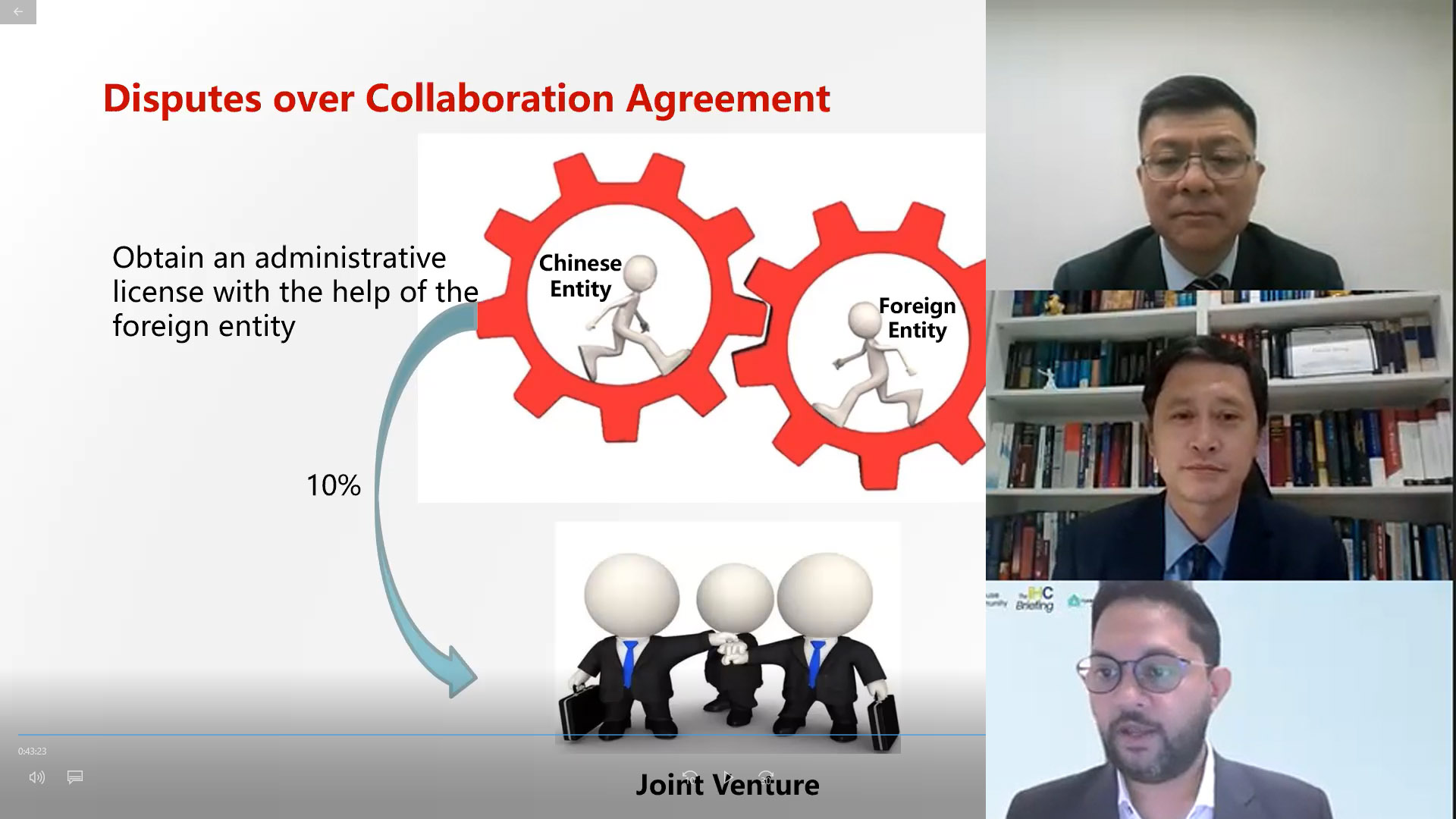November 24, 2021
Presentation by Llinks Law Offices at the Hong Kong In-House Community eCongress 2021: Res Judicata in Chinese Arbitration Including: Triple identical test Cause of action estoppel Issue estoppel Abuse of process (claim splitting) Presenting Firm: Llinks Law Offices Speakers: Charles Qin, Partner Patrick Zheng, Partner The Hong Kong In-House Community eCongress 2021 was attended by over 400 in-house counsel in Hong Kong and the wider region. Charles Qin and Patrick Zheng from Llinks Law Offices presented on Res Judicata in Chinese Arbitration. You can watch the video of the presentation above or by clicking here. If you have any questions or would like to receive a copy of the presentation slides, please contact the presenters directly. Their contact information is below. Charles Qin, Partner Dispute Resolution, Banking and Finance, Corporate/M&A, Private Equity/Venture Capital, Trust and Insurance charles.qin@llinkslaw.com +86 21 3135 8668 Patrick Zheng, Partner Dispute Resolution partick.zheng@llinkslaw.com +44(0)2032834337 llinkslaw.com... November 16, 2021
It has always been Philippine policy to prioritize the welfare of Filipino workers. Following the mandate of the Labour Code, employers may engage the services of a non-resident alien only if no Filipino is competent, able and willing to perform the service. This method of analysis, also called the “Labour Market Test,” is used by the Department of Labour and Employment (DOLE) whenever foreign nationals apply for an Alien Employment Permit (AEP). The AEP is a permit issued by the DOLE to foreign nationals working in the Philippines for a local company. DOLE Department Order (DO) No. 221, series of 2021, or the Revised Rules and Regulations for the Issuance of Employment Permits to Foreign Nationals (the “New AEP Rules”), which took effect on 6 May, 2021, promotes the preferential use of Filipino labour, affords heightened protection to Filipino nationals and safeguards their interests by regulating the employment of foreign nationals. Prior to the effectivity of DO No. 221-21, the Labour Market Test was satisfied once the DOLE publishes/posts the AEP application in a newspaper of general circulation, the DOLE website and the Philippine Employment Services Office job boards. The notice shall indicate that any qualified Filipino national may file an objection at the DOLE Regional Office to contest the foreign national’s AEP application. However, under the New AEP Rules, employers are required to publish the job vacancy that is intended for the foreign national at least 15 calendar days prior to filing the AEP application. The employer’s publication of the job vacancy is in addition to the Labour Market Test conducted by the DOLE once the AEP application... November 15, 2021
Thailand did not have a specific data protection law until 2019 when the Personal Data Protection Act (PDPA) and the Cybersecurity Act (CSA) were promulgated. The PDPA sets high standards for personal data protections and is largely based on the EU’s General Data Protection Regulation (GDPR) with the intention of having equitable standards. For example, the PDPA mirrors the GDPR’s legal basis for data processing, extraterritorial applicability, and a data subject’s rights. However, the two are not identical. While the PDPA specifically prescribes that a request for consent must be explicit in a written statement or via electronic means (unless such a request cannot be done), the GDPR focuses on consent being given by a clear affirmative act, such as an explicit oral statement. Also, the PDPA imposes criminal penalties for non-compliance in addition to monetary and administrative penalties. 2. The PDPA The PDPA has been effective since 28 May, 2019, but the enforcement of most provisions is delayed until 2022. Key provisions for personal data protection, a data subject’s rights, duties of a data controller and processor, complaints, civil liabilities and penalties will not be effective until 1 June, 2022. Scope of law Generally, the PDPA applies to the collection, use or disclosure of personal data by a data controller or processor in Thailand. As in Article 3 of the GDPR, the PDPA also applies extraterritorially to the collection, use or disclosure of personal data of Thailand-based data subjects by a foreign data controller or processor in relation to the following activities: the offering of goods or services to data subjects in Thailand the monitoring of the behavior... November 15, 2021
Appointing provisional liquidators is a powerful tool, but one which often has a serious impact on the commercial operations and business reputation of a company, and so is not a step to be taken lightly. This article examines recent judicial trends in the Cayman Islands regarding the appointment of provisional liquidators, and in particular, in relation to the balance of justice that needs to be weighed as between a petitioner and the company. The appointment of provisional liquidators by the Cayman Court is a powerful and valuable tool in the right circumstances. However, in a series of recent cases, the Court has underscored the high hurdles that must be met and emphasized that an order to appoint provisional liquidators must always be viewed as a serious step that requires a heavy and onerous evidential burden on those who seek such orders. Weighing the balance of justice between a petitioner and the company, the overriding principle is that the court should take whichever course seems likely to cause the least irremediable prejudice to one party or the other. [1] Section 104(2) of the Cayman Islands Companies Act (2021 Revision) provides that at any time after the presentation of a winding up petition but before the making of a winding up order a creditor or contributory of a company may apply to appoint provisional liquidators where there is a prima facie case for making a winding up order and where such appointment is necessary to prevent the dissipation or misuse of the company’s assets, or the oppression of minority shareholders, or to prevent mismanagement or misconduct on the part of the... November 10, 2021
The rapid development of artificial intelligence (AI) promises plenty of benefits and opportunities but also comes with risks when processing personal information. These risks include: Large-scale data processing: the extensive learning data used in AI development likely involves a variety of personal and sensitive information; Complexity and lack of transparency: the methods used in processing personal information to develop and operate AI services are complex, which makes it difficult for data subjects to know how their personal information is processed; Automation and uncertainty: the difficulty in predicting the results of data processing in automated services can lead to unexpected consequences such as privacy infringement, social discrimination and bias. A recent controversy in South Korea about AI and personal information protection involved “Lee Luda,” an AI chatbot service released on December 23, 2020. Lee Luda was quickly shut down due to complaints about its inappropriate use of personal information. For example, the providers of Lee Luda were accused of directly copying user conversations from another website they serviced without consent. Although the service providers claimed they had consent to collect and use personal information, their stated purpose for collecting and using the data – “service development” – was considered to be too abstract. To address the many issues, South Korean regulators are strengthening the safety and integrity of AI-related personal information processing. For example, the Ministry of Science and ICT released its “People-centered National Artificial Intelligence Ethical Guidelines,” while the Personal Information Protection Commission released the “Guidelines for Protecting Personal Information Processed by Automated Methods” along with the “Artificial Intelligence Personal Information Protection Self-Checklist.” This article provides an overview of... November 10, 2021
Vietnam has taken large steps to improve its cybersecurity and data protection. The task is not over, and the steps are controversial. Cybersecurity and data protection are governed by the Cybersecurity Law, the Law on Network Information Security (LNIS) and the Law on Information Technology (LIT), with the former two more relevant to cybersecurity and protection of data. Unclear and Confusing Environment Since the Cybersecurity Law came into effect in 2019, there has been an ongoing conversation largely opposing the requirement of data localization, that offshore entities must have a local presence and the government’s ability to censor “inappropriate” Internet content. Strict enforcement, it is feared, will disrupt the continuous flow of data, so crucial for commercial development. However, the government has not clarified or even enforced the law yet. Business continues to operate in the shadow of the law while awaiting guidance. The circumstances are further clouded by the broad language of the law. But lack of clarity and selective enforcement are not new in Vietnam, and they often serve the government’s purpose of indirect control. For businesses, this means past practices in a lightly-regulated environment can be voluntarily and incrementally modified. But with no detail, this is unlikely. The muddled situation may soon change. The past 12 months has seen active development of new draft legislation to clarify the current law but also focus on implementation and enforcement of current requirements. Recent Developments in Cybersecurity Legislation In early 2020, the Ministry of Information and Communications (MIC) proposed to amend Government Decree No. 72/2013 on the provision, management and use of services and information on the Internet. The... Upcoming Events
Recent Past Events
















